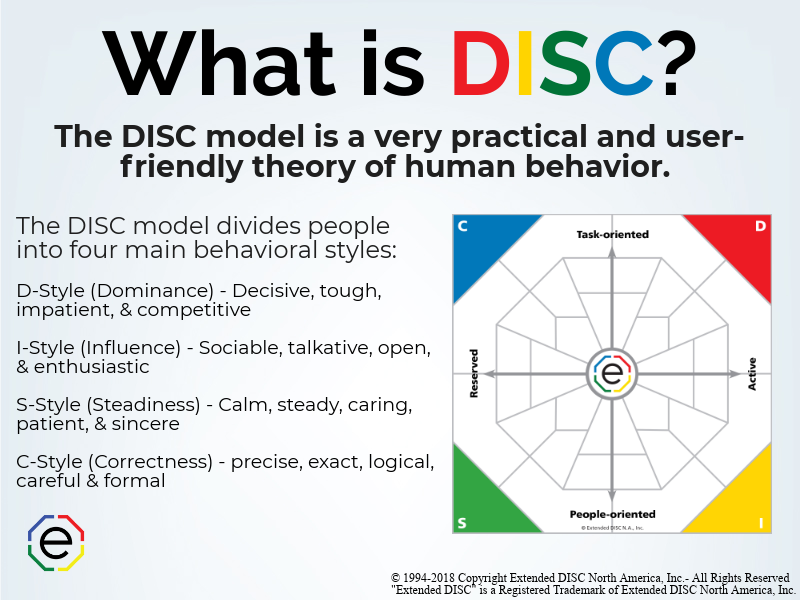I recently listened to Adam Grant's keynote talk at the 2023 SHRM Conference. As a DISC facilitator, I always tie my learnings back to how DISC can support our success.

Adam Grant is an organizational psychologist, Wharton professor, and best-selling author. His keynote topic, "Think Again: The Power of Knowing What You Don't Know" highlighted the importance of unleashing human potential in the workplace.
So, what does it mean and how can DISC help us reach our workplace potential?
Understanding Human Potential
Grants's central theme of harnessing and nurturing our untapped potential is key to fostering a culture of innovation and growth; something we should be striving for in our organization and in ourselves. He challenges the traditional notion of focusing on talent and competence. Instead, he advocates for recognizing and leveraging our unique strengths and perspectives. Grant asks us to look beyond skills and toward character traits, personal motivation, and diverse thinking styles.
Easier to say than do, right? How do we start?
The Power of DISC
 People are more than their resumes, but how do we motivate and support our team members? We need to recognize and support differences in thinking styles and perspectives, but how? We can use data and information found in DISC. The power of DISC is that it is a feedback tool, delivering information and data you use to make better decisions. Leaders and team members can better identify how others prefer to interact and do things.
People are more than their resumes, but how do we motivate and support our team members? We need to recognize and support differences in thinking styles and perspectives, but how? We can use data and information found in DISC. The power of DISC is that it is a feedback tool, delivering information and data you use to make better decisions. Leaders and team members can better identify how others prefer to interact and do things.
It's a powerful reminder that DISC is not just a communication tool. Rather, it's about supporting the success of our people based on understanding how they prefer to do things. DISC has no judgment value. There is no style that is better or worse; they are only different.
Tying DISC to concepts of safety and humility
Grant discusses another concept to unleashing potential, psychological safety. While DISC does not address psychological factors, it does provide supporting information on how to motivate and relieve stress for different styles. He emphasizes the importance of creating an environment where individuals feel safe to express their ideas and take risks without fear of retribution or judgment. A sense of safety can lead to higher engagement, employee satisfaction, and overall organizational success.
How do you find out what motivates our people or decreases their levels of stress? DISC can help us to learn and know more about one another. This can lead to an increase in trust, a decrease in anxiety, and an overall improvement in our interactions.
He also mentions intellectual humility, a trait that involves recognizing the limits of one's knowledge and being open to learning from others. Semantics aside, DISC does not measure intellect. Rather it focuses on behaviors in which we can make adjustments to better situations. DISC is a judgment-free model that helps to create opportunities to openly discuss our behavioral preferences. There is no style that is better or worse. DISC helps us understand how we see the world differently. It also helps us recognize our potential blind spots. How do we see ourselves versus how we are seen by others?
In addition, managers who openly share their own DISC profile can be viewed as taking the lead to foster openness and opportunities to learn more about each other.
Procrastination or time to ponder?
 Grant brought up the benefits of strategic procrastination where better outcomes occur when time is designated for incubation and reflection before tackling complex tasks or making decisions. He suggests that quick solutions are not always the better option. Rather, utilizing the time to gather more information, gain clarity, and consider multiple possibilities before taking action could prove to be more effective. Some of us are nodding and agreeing while some of us are shaking our heads, thinking it is counter-productive.
Grant brought up the benefits of strategic procrastination where better outcomes occur when time is designated for incubation and reflection before tackling complex tasks or making decisions. He suggests that quick solutions are not always the better option. Rather, utilizing the time to gather more information, gain clarity, and consider multiple possibilities before taking action could prove to be more effective. Some of us are nodding and agreeing while some of us are shaking our heads, thinking it is counter-productive.
The concept of procrastination can be seen and defined differently by different DISC styles. Strategic procrastination for the reserved S and C-styles could support what they are already comfortable doing. That is, to use the time to ponder possibilities and solutions. On the other hand, for the more active D and I-styles, it may be challenging to move away from quick decisions and solutions. Remember, C and S -styles can certainly make quick decisions and I and D-styles can ponder and slow down. It's just some behaviors are more comfortable for some than others. DISC reminds us of our preferences and when we need to push ourselves out of our comfort zone to achieve desired results.
Conclusion
Adam Grant's keynote address at the 2023 SHRM Conference left an impression and a challenge to the audience when it comes to supporting the success of our employees. His insights on psychological safety, intellectual humility, and strategic procrastination offer practical strategies to transform organizations into stronger environments for innovation, growth, and employee well-being.
While he provided the challenge, DISC offers a place to start.
Facilitator Note: Challenge yourself to think beyond communication. How can you incorporate DISC to support your clients and employees to be more successful?
